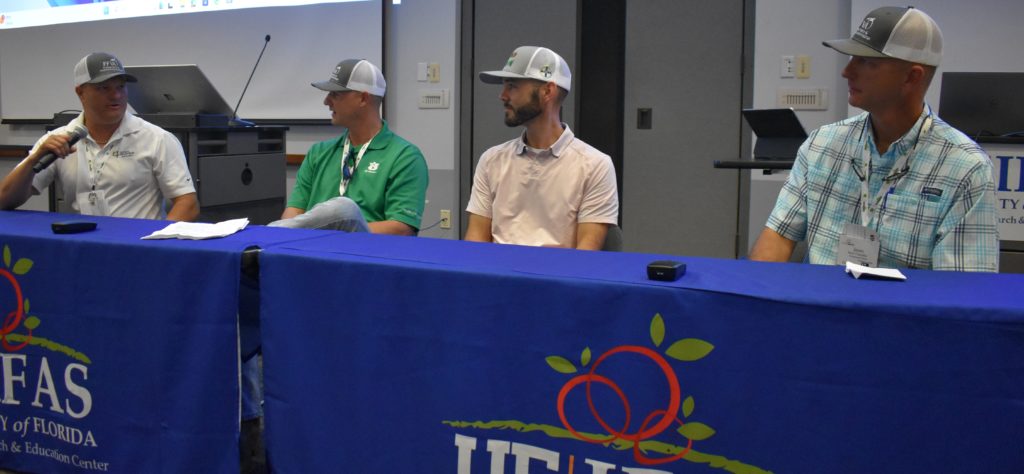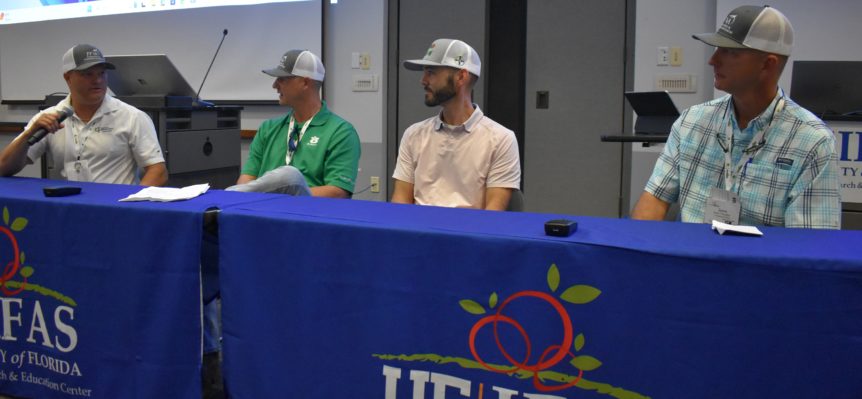
Photo by Alice Akers
By Frank Giles
The Florida Ag Expo held at the Gulf Coast Research and Education Center has become a much-anticipated event every November. The Expo draws specialty crop growers from across Florida and beyond. The latest Expo featured a panel discussion of alumni from the Florida Fruit & Vegetable Association’s Emerging Leader Development Program (ELDP). The program provides a year-long comprehensive educational experience for agricultural advocates.
The panel of four growers, who have already moved into positions of responsibility and leadership, shared insights and ideas from a younger generation’s perspective. After their discussion, there was great feedback from the audience on how good of a job the panelists did. Some attendees were inspired and felt it was one of the best panel discussions they had seen.
On Leadership
The panelists weighed in on their experience of going through the ELDP and why it is important for young growers to step into leadership and advocacy roles.
“As farmers, we can kind of get tunnel vision working in our little world,” Jason Chandler said. “For me, the program allowed me to get out of the three-to-four-county area that I farm in and grew up in. We toured farms in parts of Florida (and in California) that I’ve never been to before and learned how these generational, legacy farms have had to pivot to keep going while dealing with all the challenges farms face today whether it be eminent domain, succession planning, market shifts or storms.”
Marshal Sewell added the program shined a light on the political process and its importance, even if that’s not necessarily in one’s comfort zone.
“It was an enlightening opportunity with the ELDP Tallahassee trip where you got to see the process behind the people making the (political) decisions. They are marking the decisions that are impacting us at the field level, and it was really eye-opening,” Sewell said. “We don’t necessarily want to be bothered, we don’t necessarily feel like we need to be answering any questions to anybody, but quite often in today’s day and age, now more than ever, we must be advocating for our lifestyle and for our production needs … Challenge yourself to learn these different areas that you may not be as well versed in. Challenge yourself to be advocates for your own operation. Be advocates for your neighbor and other members of the ag community.”
On Trade
Michael Hill said leaders have been talking about trade since he was a baby, and unfortunately, it is still being talked about with little progress toward protections for specialty crop growers. He added crops like blueberries and strawberries are a small lobby when compared to row crops, and their interests often don’t align.
“Imports from Mexico affect blueberries and strawberries to a great degree here in Florida. When we got in business in 2010, Mexico was shipping less than a million pounds of blueberries into the United States. Today, they’re shipping around 130 million pounds,” Hill said. “So, it is really making us think about how we need to change the way we grow blueberries. We are working closely with the University of Florida with genetics to breed new varieties suited for machine harvest.
“To give you an idea, it’s about $1.38 here to handpick a pound of blueberries. The cost of running a machine is around 10 cents per pound, and Mexico is paying around 35 cents, so anytime we can beat Mexico at their own game, sign me up. So, blueberries are a crop I feel like we’re moving in the direction of mechanical harvest.”
Visually Appealing
Another key advantage Southeastern growers need to exploit to compete with imports is producing high-quality fruit. Dustin Grooms agreed, noting that consumers buy with their eyes.
“On our farm, we have field workers who inspect the quality of the crop, people at the shed who inspect, at the packinghouse they inspect, and then on to distribution, they inspect,” Grooms said. “It goes through many inspections to ensure quality. It is important to have good quality standards on your farm to get through all those inspections.”
Hill added it doesn’t appear likely that trade barriers protecting perishable Southeastern crops are on the table. He suggested a model where major retail providers are given an incentive to buy U.S.-grown product to help make up the difference between prices of domestic- and foreign-grown produce might be worth a look.
On Labor
The panelists agreed labor ranks at or near the top of grower concerns. The H-2A program has become critical in the absence of a domestic workforce.
“We all know the hurdles you have to work through with the program, but it is necessary. In our business, orders must go out regardless of labor,” Chandler said. “Years ago, we built housing for the employees and a plan to manage the program. And with all the hurdles of the program, it really has been pretty good for us. We have a lot of workers who come back year after year.
“The labor problems we have now are in the skilled positions. With the equipment we have and technology in the tractors, it is almost like you are competing with engineering firms for employees. We have had to take our key operators who have been on the farm for a long time and take them maybe out of the comfort zones to train our H-2A workers, so they can learn this new technology. We must take the training with H-2A workers to a higher level.”
On Mental Health
Sewell told attendees about his work in mental health awareness and a program he and his family started to address it.
“Mind Your Melon started based on my own family’s experience. Years ago, we got strawberry transplants from a nursery. Soon after we planted, we had an anthracnose outbreak in the field, and plants were dying left and right,” Sewell said. “When faced with all that pressure and uncertainties in our family operation, there are not many clear answers of what to do when all that happens. My dad ultimately made the decision to end his own life.
“People need to realize these challenges, risks and stresses in agriculture are all too real, especially in the specialty crop market. The Mind Your Melon concept that my family developed aims to address mental health awareness in agriculture. It is intended to help people recognize and manage the stresses they face in daily life.”
The Mind Your Melon program includes various resources for growers, including a podcast that discusses mental health. The program helps growers manage stresses like farm finances and production challenges. Visit mindyourmelon.org to learn more.










